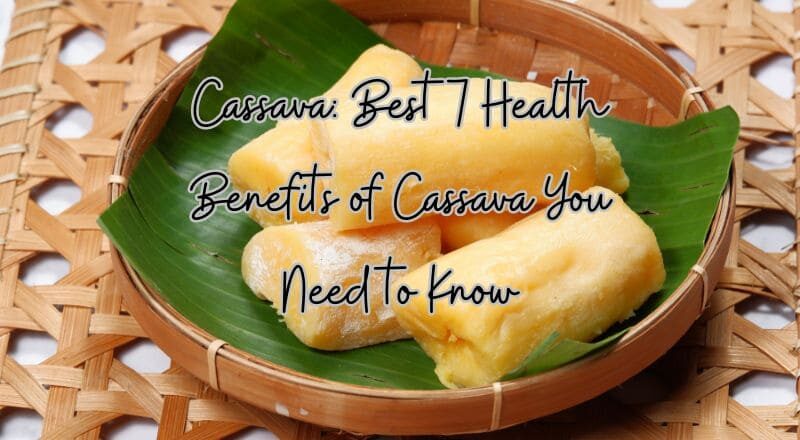Cassava, also known as yucca or tapioca, is a starchy tuber that is widely grown in tropical and subtropical regions of the world. It is an important food crop in many countries, particularly in Africa, South America, and Asia.
Cassavas has long been used as a food source and is prized for its high carbohydrate content in tropical and subtropical regions of the world, especially in Africa, Asia, and Latin America. Is an important food crop for millions of people in these regions, as it is a good source of carbohydrates, fiber, and nutrients such as vitamin C and potassium.
Cassava’s can be boiled, mashed, fried or roasted, and is used in a variety of dishes. Such as bread, cakes, and puddings. The root can also be ground into a powder, often used as a thickener for sauces for stews, or to make tapioca pudding. Cassava leaves are also edible and used as a vegetable in some cultures.
However, tubers also contain cyanide compounds. Which can be toxic if the tubers are not processed or cooked properly. Therefore, it is important to take precautions when handling and preparing. Is a nutritious root vegetable that is consumed in many countries around the world.
Cassava’s Nutrition facts
Cassava’s, also known as yuca or manioc, is a starchy root vegetable that is a significant source of carbohydrates in many tropical regions. Here are some nutrition facts about cassava:
Carbohydrates: Cassava is predominantly composed of carbohydrates, specifically complex carbohydrates. It is a good source of energy and contains about 38 grams of carbohydrates per 100 grams.

Calories: Cassava’s relatively high in calories due to its carbohydrate content. 100 grams of cassava contains around 160 calories.
Fiber: Cassava’s a good source of dietary fiber, which aids in digestion and promotes a feeling of fullness. It contains approximately 1.8 grams of fiber per 100 grams.
Protein: While cassava is not a significant source of protein, it does contain about 1.4 grams per 100 grams. It is important to combine cassava with other protein-rich foods to meet daily protein requirements.
Fat: Cassava is low in fat and contains only a minimal amount of around 0.3 grams per 100 grams.
Vitamins: Cassava contains several vitamins, including vitamin C, thiamine (B1), riboflavin (B2), and folate (B9). However, the vitamin content may vary depending on the type and preparation of cassava.
Minerals: Cassava provides essential minerals such as calcium, iron, magnesium, phosphorus, potassium, and zinc.
Antioxidants: Cassava contains antioxidants, such as flavonoids, which help neutralize harmful free radicals in the body.
It is important to note that cassava contains naturally occurring cyanide compounds, which can be toxic if not properly processed and prepared. Therefore, it is crucial to ensure cassava is thoroughly cooked before consumption to eliminate these toxins.
Cassava health benefits
Cassava is a root vegetable that is commonly consumed in many parts of the world. Apart from being a staple food, cassava also offers several health benefits. Here are seven important benefits of including cassava in your diet:
Nutrient-rich: Cassavas is a good source of essential nutrients such as carbohydrates, fiber, vitamins, and minerals. It contains vitamin C, vitamin B6, potassium, magnesium, and manganese. These nutrients contribute to supporting overall health and well-being.
Energy booster: As cassava is high in carbohydrates, it serves as an excellent energy source. Consuming cassava can provide a steady release of energy, making it ideal for athletes, individuals engaged in physical activities, or those needing an energy boost.
Digestive health: Cassava contains a significant amount of dietary fiber, which aids in digestion and prevents constipation. It promotes regular bowel movements, helps maintain a healthy digestive system, and prevents the occurrence of gastrointestinal issues.
Gluten-free:
Cassava is naturally gluten-free, making it an excellent choice for individuals with gluten intolerance or celiac disease. Gluten-free diets have become increasingly popular, and cassava can serve as a safe and nutritious alternative.
Promotes heart health: Cassava contains compounds that help reduce inflammation and lower blood pressure levels. The high potassium content also contributes to maintaining a healthy blood pressure, reducing the risk of cardiovascular diseases.
Enhances immune system: Cassava’s rich in vitamin C, an antioxidant that helps boost the immune system. Regular consumption of cassava can support your body’s defense against infections and diseases.
Skin and hair health: Cassavas contains nutrients like vitamin C, zinc, and copper that promote collagen production, which is essential for maintaining healthy skin and hair. These nutrients contribute to skin elasticity, hair strength, and overall skin and hair health.
It’s important to note that while cassava offers numerous health benefits. It should be prepared and cooked properly. Before consumption to eliminate any traces of cyanide compounds. Which are naturally present in raw cassava’s. Therefore, it’s advisable to follow appropriate cooking methods to maximize its benefits and ensure safety.
Cassavas Recipes:
Cassavas Fries:
Peel and cut cassava into long and thin strips.
Boil the cassava in salted water until tender.
Drain and let it chill for periodic minutes.
Heat oil in a serious fryer or an in-depth pan.
Fry the cassava’s strips until golden and crispy.
Mist with salt and perform with your choice of dipping gravy.
Cassavas Cake:
Grate cassava’s using a cheese grater.
In a mixing bowl, combine grated cassava’s, coconut milk, sugar, and eggs.
Stew in melted butter and vanilla.
Pour the mixture into a greased baking dish.
Bake in a preheated oven at 350°F (175°C) for about 45 minutes or until the top is golden brown and set.
Let it cool back, slicing and serving.
Cassava’s Pudding:
Peel and grate cassava using a cheese grater.
In a mixing bowl, combine grated cassava, coconut milk, sugar, eggs, and grated nutmeg.
Stew well until all the ingredients are blended.
Pour the mixture into a greased baking dish.
Bake in a preheated oven at 350°F (175°C) for about 45 minutes. or until the top is golden brown and the pudding is set.
Allow it to cool before serving.
Cassava’s Stew:
Cut cassava into chunks and boil in salted water until tender.
In a big pot, warm oil and sauté minced onions, diced garlic, and chopped bell peppers until chilled.
Add tomatoes and tomato paste to the pot and cook for a few minutes.
Stir in cooked cassava’s chunks, vegetable or chicken broth, and your choice of protein (chicken, beef, or shrimp).
Season with salt, pepper, and your preferred spices (such as thyme or paprika).
Simmer the stew over medium heat for about 20-30 minutes or until the flavors meld together.
Serve the cassava’s stew hot with rice or bread.
Cassava’s Bread:
Peel and grate cassava using a cheese grater.
In a mixing bowl, combine grated cassava, grated coconut, sugar, and coconut milk.
Stir in melted butter, baking powder, and a pinch of salt. Spray the batter into a greased loaf pan. Bake in a preheated oven at 350°F (175°C) for about 1 hour or until the bread is golden brown and cooked through. Let it cool before slashing and serving.
click here: Oats:10 Surprising Health Benefits of Eating Oats Every Day
